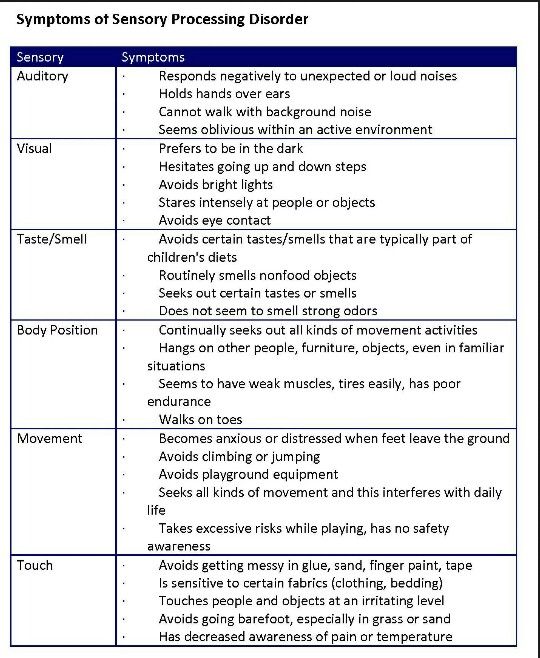How to make your shy child confident
How to help your shy kid get confident
Confidence is defined as “Trust or faith in a person or thing; A feeling of reassurance, especially of self-assurance.”
A parent recently asked me how they could gently give their child more confidence.
The Montessori approach engenders confident children as these children are shown every day that we believe they are capable individuals, able to look after their own needs, and as they grow a little older, to the needs of others and their environment.
Download this simple chart to print out to remind you!
Top tips how to help your shy kid get confident1. Stop calling them “shy”
It is a very difficult label to grow out of and often becomes self-fulfilling. Instead, if someone comes up to talk to them and they hide behind you, you can get them to practise saying something like, “I don’t feel like talking right now.”
2. If your child takes some time to warm up at parties etc, give them the time to stand with you and observe until they are ready to participate
Don’t give it too much attention. Make it quite boring for them standing with the adults watching. But also give your child the message that you accept them as they are and know that they will go and play when they are ready.
3. Some children need to know in advance
Preparing children in advance so they know what to expect can give them more confidence.
For example, if you are about to see Sinterklas arriving in Amsterdam, you can prepare your child by letting them know that there are going to be a lot of people but you will be holding their hand all the time. You can tell them that there will be lots of Zwarte Piets with their faces painted black offering pepernoten to the children etc. Or it may be telling your child about how many people will be at a party and what the plan is (you can always ask the host in advance).
4. Role playing
It can give children more confidence to practise certain skills like making friends, using their words, saying thank you, or clapping at a play. It takes practice to develop these skills and some children find role playing very useful.
5. Never compare a child to a sibling or friend, even out of frustration
Sometimes in our efforts to inspire kids we use friends or siblings as role models. Comments such as “Look how your sister plays with the others?” actually discourage these kids rather than encourage them. Compare kids only with themselves not others.
6. Show your child how to do things for themselves
A child who is shown how to do things for themselves, grows in confidence each time they dress themselves, clear their plates from the table, wipe up a spill etc. This applies for all kids, especially kids who can feel self-conscious at times.
7. Educate yourself about introversion
If you think your child may be an introvert, it would be a worthwhile investment of your time to read “Quiet: The Power of Introverts in a World that Cannot Stop Talking”. I love this byline, and I love this book. I wrote a little about it here.
I think it is difficult to raise a child who can be shy at times because society almost expects that every child should be chatty and easy to talk to. Understanding introversion will help parents not only see the world through their child’s eyes, but be aware how they can help their child.
Understanding introversion will help parents not only see the world through their child’s eyes, but be aware how they can help their child.
I truly think we can support children who appear to be shy. Try these tips and let me know how you go.
How to Help a Shy Child Gain Confidence: 7 Things to Try
family
By Alexia Dellner
Published Aug 7, 2017
Is your kid is a total chatterbox at home but clams up in social situations? Or maybe he’s always been timid (and permanently attached to your side)? According to Bernardo J. Carducci, Ph.D., professor of psychology and director of the Shyness Research Institute at Indiana University Southeast, shyness during childhood is very common. The good news is there are plenty of things that parents can do to encourage little ones to come out of their shell. Here, seven tips on how to help a shy child gain confidence.
Koldunov/Getty Images
1. Don’t intervene
If you see your kid struggling to make friends at the playground, it’s tempting to step in and give her a gentle nudge toward the group hanging out by the swings. But Dr. Carducci warns that if you get involved, your child won’t learn “frustration tolerance” (i.e., how to deal with the particular situation that they find themselves in)—a valuable skill that she’ll need beyond the schoolyard.
But Dr. Carducci warns that if you get involved, your child won’t learn “frustration tolerance” (i.e., how to deal with the particular situation that they find themselves in)—a valuable skill that she’ll need beyond the schoolyard.
2. But do stay nearby (for a short while)
Let’s say you’re dropping your child off at a birthday party. “Make it a point to stay there until she feels comfortable with the situation,” advises Dr. Carducci. The idea is to give her a chance to warm up to the noise and new environment. Stick around until she feels at ease with the group but then walk away. “Don’t stay the whole time—let her know that you’re going to be back and that she’s going to be fine.”
Wavebreakmedia/Getty Images
3. Prepare them for new situations
Imagine that same birthday party. Going to somebody’s house for the first time can be nerve-racking. Help your kid by talking her through the scenario beforehand. Try something like: “We’re going to Sally’s birthday party next week. Remember that you’ve been to birthday parties before, like at Uncle John’s house. At birthday parties, we play games and we eat cake. We’re going to do the same kind of thing, just at Sally's house.”
Remember that you’ve been to birthday parties before, like at Uncle John’s house. At birthday parties, we play games and we eat cake. We’re going to do the same kind of thing, just at Sally's house.”
4. Lead by example
“Never ask your child to do anything that you wouldn’t be willing to do yourself,” says Dr. Carducci. Be warm and friendly with people that you meet (children learn by mimicking behavior), but if you wouldn’t feel comfortable walking up to a group of strangers, then you can’t expect your child to do the same (even if those strangers are her new classmates).
5. Don’t push things too quickly
Introduce your kid to new things by using the “factorial approach,” a technique where you change just one or two things at a time. For example, start by inviting that new toddler neighbor (and mom friend!) over to your house for a playdate on your home turf. Once they’re playing together comfortably and happily, change the environment by bringing both kids to the park. Once that situation becomes more comfortable, you could invite another friend to join in. Go slowly to give your child time to adjust to and engage with each step.
Once that situation becomes more comfortable, you could invite another friend to join in. Go slowly to give your child time to adjust to and engage with each step.
FatCamera/Getty Images
6. Talk about a time you felt anxious
Even less-shy kids can demonstrate "situational shyness," explains Dr. Carducci, especially during periods of transition like moving or starting school. Let your kid know that everyone feels nervous from time to time. And more specifically, talk about a time where you felt social anxiety (like speaking in public) and how you handled it (you gave a presentation at work and felt really good afterward).
7. Don’t force it
You know what? Your kid may never be the most outgoing person in the world. And that's OK. Just make sure that he knows that, too.
More Stories You'll Love
family
by PureWow Editors
Want a Unique Name for Your Baby? Here are 20 Names No One Else in Your Kid's Class Will Have
family
by Sarah Ashley
Should I Get a Dog? 7 Questions to Ask Yourself Before Bringing Home a Pup
family
by Emma Singer
I Love My Kids, But I Hate Playing With Them
family
by Alexia Dellner
When the Push Present Comes Before the Baby (Also It's From Myself)
family
by PureWow Editors
In the Wake of the Duxbury Tragedy, Moms Are Taking to TikTok to Share Their Own Experiences with PPD
family
by Emma Singer
At What Age Should a Kid Get a Phone? We Asked a Therapist, a Digital Safety Expert and Fellow Parents
How to develop a sense of self-confidence in a child
home
Parents
How to raise a child?
How to build a child's self-confidence
- Tags:
- Expert advice
- 0-1 year
- 1-3 years
- 3-7 years
- 7-12 years old
- teenager
- communication skills
Various factors influence the formation of confidence in childhood: the attitude of parents, peers, teachers towards the child, as well as the first successes and defeats. When a child goes to school, his qualities and abilities undergo a serious "test" for strength. In order for this test to be successful, parents should in advance, from the age of four or five, start educating their children in self-confidence and their abilities.
When a child goes to school, his qualities and abilities undergo a serious "test" for strength. In order for this test to be successful, parents should in advance, from the age of four or five, start educating their children in self-confidence and their abilities.
Today, psychologists identify six basic rules that help in one way or another to build self-confidence in a child.
1. Begin with yourself
Children take on many traits and behaviors of their parents. So before you start building confidence in your child, pay attention to your relationship with your spouse. Children react very painfully to parental quarrels, even if they are not their participants or witnesses. The tense atmosphere that reigns in the house after any conflict negatively affects the emotional state of the child, undermining his trust in his parents. Try to show respect for each other under any circumstances, then your child will feel more confident. In families where the "microclimate" is bad, children are unlikely to grow up as optimists and be at least somewhat socially successful. The parent's self-doubt is passed on to the child, who reproduces their low self-esteem. And she, in turn, can cause his failure in any activity - this is how a vicious circle arises.
The parent's self-doubt is passed on to the child, who reproduces their low self-esteem. And she, in turn, can cause his failure in any activity - this is how a vicious circle arises.
According to some experts, raising a child's confidence should not be an end in itself for parents. First of all, form in it a harmoniously developed personality. And this requires conversations with the child, encouragement of his initiative, respect for the personality of the child, a normal microclimate in the family. You can find out how the singer and actress Anastasia Stotskaya is raising her son Alexander by watching the program “We Are Parents”.
2. Develop communication skills
Self-confidence is formed in the course of interaction with other people. Teach your child to express their desires and feelings. Shy children often follow other people's opinions because they do not know how or are embarrassed to explain to others what they want.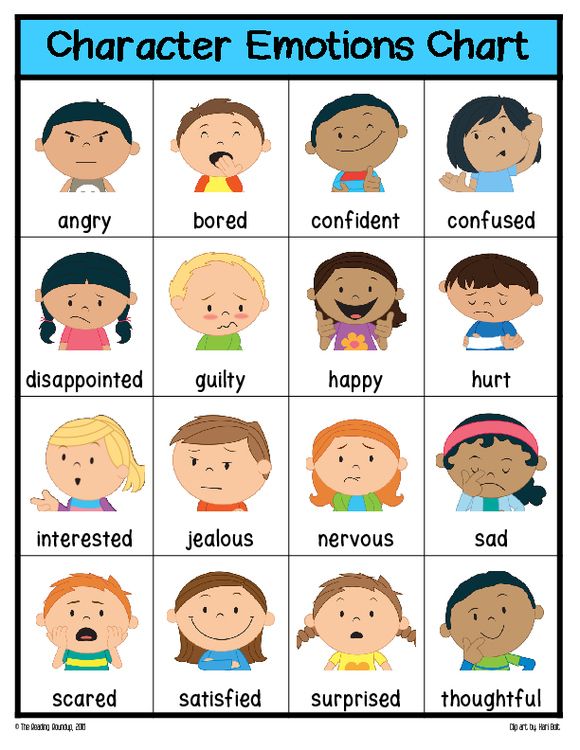 It is necessary to teach such children the skills of communication with peers. To do this, you can make a list of phrases that help build a conversation, and rehearse dialogues on various topics. A good help for such activities are role-playing games, where each participant is given the opportunity to be in the lead role.
It is necessary to teach such children the skills of communication with peers. To do this, you can make a list of phrases that help build a conversation, and rehearse dialogues on various topics. A good help for such activities are role-playing games, where each participant is given the opportunity to be in the lead role.
3. Do not compare a child with other children
Comparing a child with other children, and not in his favor, adults run the risk of forming an inferiority complex in him, which interferes with the harmonious development of his personality. The child's lack of confidence in the support of parents leads to the fact that he begins to feel unloved and unwanted. For normal development, children need to be in an atmosphere of love and psychological well-being. It is important for a child to be sure that in difficult times, parents will always come to his aid.
4. Recognize the child's right to be who he/she is
It is not uncommon for adults to want their children to have certain qualities and abilities that they consider useful for the child. In an effort to bring them up in their baby, parents do not notice or do not appreciate the qualities that the child has. Try to objectively evaluate your expectations from children: are they too high? In this case, the child may be haunted by the fear of not meeting your expectations, fear of failure, which undermine the basis of his faith in himself. It also matters how well adults are able to understand the needs and interests of their child. Accept the child as a person. Then there will be fewer reasons for reproaches, and much more reasons for pride and praise.
In an effort to bring them up in their baby, parents do not notice or do not appreciate the qualities that the child has. Try to objectively evaluate your expectations from children: are they too high? In this case, the child may be haunted by the fear of not meeting your expectations, fear of failure, which undermine the basis of his faith in himself. It also matters how well adults are able to understand the needs and interests of their child. Accept the child as a person. Then there will be fewer reasons for reproaches, and much more reasons for pride and praise.
5. Develop talents and abilities
Help your child find activities that will help develop their existing abilities. A positive result will not only give self-confidence, but also increase his self-esteem. The main thing is that these activities should not be forced, otherwise they will not bring any benefit or satisfaction to the child. Therefore, do not insist on what exactly you think is more useful for him. Give him the opportunity to determine what he wants to do (for example, music, sports or art). On our website you can find out how to choose a creative studio or sports activities for a child.
Give him the opportunity to determine what he wants to do (for example, music, sports or art). On our website you can find out how to choose a creative studio or sports activities for a child.
6. Praise the child for any merits
Any, even insignificant, successes of children should not go unnoticed by parents. Praise your child for merit: for good grades in school, for winning sports competitions, for a beautiful drawing, for obedience. Praise will have a beneficial effect on his self-esteem. However, the guest of the program "How to Raise a Happy Child" Elena Piotrovskaya suggests not just praising the child for his actions. Child psychologist offers to communicate with the child. It is interesting to replace direct praise with qualitative and quantitative questions about the work done by the child. And let him draw a conclusion about your attitude to his act. Genuine interest and the lack of a direct qualitative assessment of his activities will help develop an analytical mindset in a child.
If you have not received an answer to the question of how to instill a sense of confidence in a child, ask it to the expert of the portal "I am a parent". To do this, use the feedback form in the heading "Consultation of a psychologist".
Nadezhda Malinkina
Take the test on our portal and find out if you spoil your child.
Do you spoil your child?
6 ways to help your child become self-confident
children's center and
youth
Development
Phones
+7(495)135-15-45+7(901)388-61-35
Author: Anastasia Rybakova
Contents:
- Self-confidence - what is it?
- Why does a child need self-confidence?
- The child has become unsure of himself - what are the reasons and what to do?
- 6 ways to help your child become self-confident
- Psychologists' advice on dealing with self-doubt
- My personal experience - how I dealt with uncertainty
In today's world, situations often arise when parents see that a child is withdrawing into himself, he has problems with self-esteem, with communication and hobbies, and not only. These are all signs that the child lacks self-confidence. My name is Nastya, I am 16 years old, and I decided to figure out why this is happening and how to help the child (and parents too) cope with this phenomenon.
These are all signs that the child lacks self-confidence. My name is Nastya, I am 16 years old, and I decided to figure out why this is happening and how to help the child (and parents too) cope with this phenomenon.
Self-confidence what is it?
To make our conversation more informative, we need to understand some key theoretical points.
What is self-confidence? We can talk about many things, this is an adequate, directed in a positive direction, assessment of oneself and one's capabilities, the ability to accept one's shortcomings...
This is what helps not to give up even in the most difficult times of life, to go forward, no matter what.
Why does a child need self-confidence?
We are used to the fact that adults think about self-confidence more often than children, it is more important for them. It's probably some kind of stereotype. After all, kids need more than that. Even more. Let's figure out why.
Confident children grow into self-confident adults!
That is, it is worth developing a child's self-confidence, at least so that everything is fine in his adult life. The phrase we all come from childhood fits here more than ever. All children's grievances, complexes, and so on greatly affect our place in life, success in the future.
Psychologists have found that the degree of success in adulthood directly depends on the degree of self-confidence.
- A child needs confidence in order to:
- He had healthy relationships both in the family and with peers;
- He easily studied, passed exams and answered at the blackboard;
- Tried new things and was not afraid to make mistakes;
- To grow up as a happy person.
Nowadays this character trait is simply necessary everywhere and in everything!
The child has become unsure of himself - why and what to do?
It happens that initially the child was quite self-confident, open and positive, parents worked on developing this quality, but suddenly he became more closed, more and more often a negative mood began to prevail.
First you just need to talk to him. Perhaps he himself will tell you the reasons for his behavior, his isolation. But if not, here are the 3 most common causes of self-doubt in toddlers:
- Lack of love
If a child feels some kind of alienation from people close to him, he withdraws into himself and feels anxiety and loneliness.
- No support
If you are constantly on anyone's side, but not for your child, leave him alone with his fears and do not help the child to fight them or experience them together, then the child experiences some kind of confusion, excitement.
- Intimidation, aggression
If you often shout at your child, frighten him, for example, with various difficulties, or beat (!!!) there is nothing surprising in the fact that the child is not self-confident. In this case, there is also no question of trusting relationships in the family.
6 ways to help your child become self-confident
So how can you help your child become more self-confident?
I have 6 tips for you:
- Do not criticize, but support and guide
How many of us like it when our work or our actions are criticized, and sometimes unjustifiably? That's right, nobody.

Your support is very important for your child.
For example, oh my god, never draw again, you're awful at it, it's not yours, but well done, you try so hard! Try again, you will definitely succeed!
I think the difference is obvious. In the first case, the child will be upset and with a 99% probability will no longer touch drawing, and most likely will destroy his talent, albeit hidden under a hundred randomly painted sheets. And in the second, the child will try again and again, and someday he will become, perhaps not Van Gogh, but a very good artist.
- Let the child make mistakes
At the same time, from childhood, let him understand that he himself bears responsibility, although not yet complete, but nevertheless, for his actions and what they led to. Tell your child why mistakes are okay.
We are not all perfect.
Again, returning to the previous paragraph, direct. Let's have a choice.
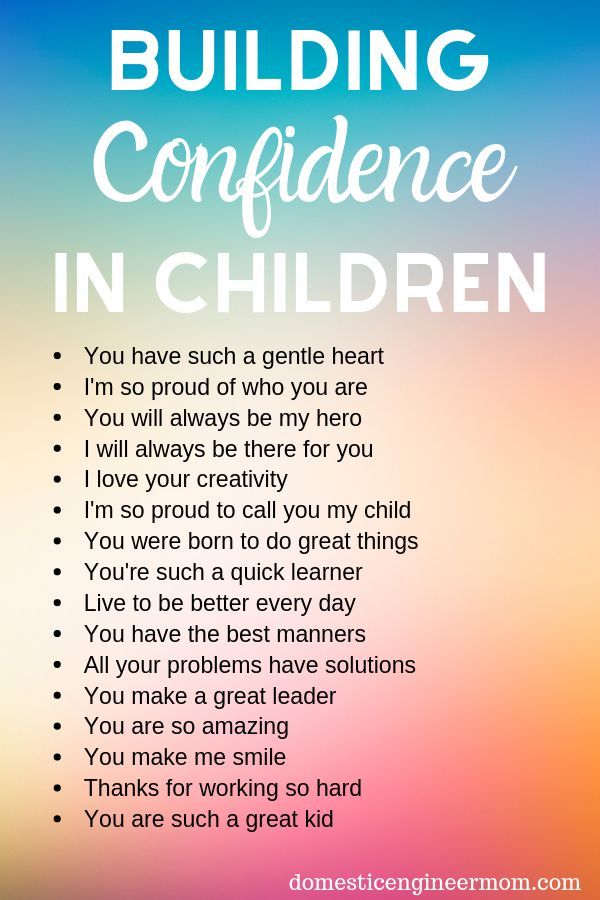 Let the baby understand that he can choose this or that, and learn to understand the consequences of his choice.
Let the baby understand that he can choose this or that, and learn to understand the consequences of his choice. - Emphasize the child's strengths
Each of us has something that turns out better and worse
If a child cannot sing, but he dances beautifully, give him the opportunity to develop in the area that causes positive emotions in him, in which he feels comfortable.
No need to force him, figuratively speaking, to stand on a stool in front of the guests and sing, this will confuse the child, and knowing that vocals are not his forte, such a situation will remain in his head for a long time in the form of a kind of nightmare.
- But at the same time, explain to the child why one should accept one's shortcomings
I must say right away that this advice is more suitable for a teenager. Explain that shortcomings are also one of the sides of his character, and that it is worth working on it.
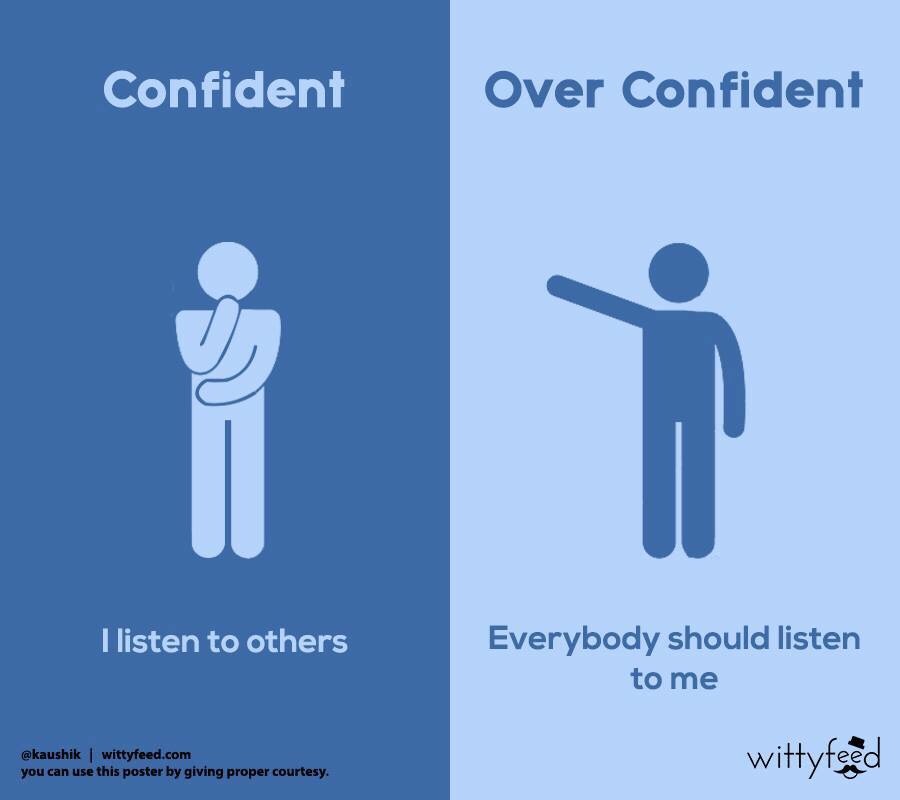
Show by example how to get rid of some complexes.
If there is a fear of public speaking, try to be in situations where you need to say something to a large enough audience as often as possible, etc.
Having overcome one or another of his fears, a teenager will almost immediately feel much more self-confident.
- Instill in your child the habit of continuous development
Again, this advice applies more to teenagers. Now in the world of teenagers there are two trends: some of us prefer to stay at home, playing computer games and spending days on end in virtual life, others still strive to learn as much as possible new, to know the world and find our place in it through continuous development. I am glad that the second over time becomes more and more.
If the child is not instilled from childhood, and then not explained in adolescence the full significance of continuous development, he may have problems at least with self-esteem, hence with self-confidence.

People who love development and realize its value are more self-confident, and this is an indisputable fact.
- Do not compare
The fact that parents constantly compare the child with someone else, especially if the comparison is clearly not in the child's favor, discourages him from doing something because there is always someone better.
Consequently, there is no need to talk about self-confidence in a baby growing up in such a family, but there are more than enough inferiority complexes.
Each person is unique, and you need to love and try to accept your child as he is.
Naturally, these are not all ways to help a child become self-confident, but only a part, but they are one of the most effective.
Of course, you also need to take into account the age characteristics of the child and apply the above tips, focusing on the age of your child.
1 to 3 years old , for example, the baby needs to be given at least a little independence and gradually expand its boundaries.

From 3 to 7 years old a child can already see the difference between his physical and emotional states and somehow correct them depending on the situation. It is at this age that children are most often prone to copying the behavioral models of their parents, so take care of yourself as well.
Psychologists' advice on dealing with childhood insecurity
What do psychologists think about this? How do they see a competent struggle with self-doubt? Let's find out now!
The most important thing to do is love yourself.
The first step towards this is to accept yourself.
It is more difficult for a child to do all this, he is not yet so knowledgeable in psychology and in principle of life, so you should tell him about it. Show such things with your own example.
Tell him a simple truth no matter what you do, I will always love you, I will always be on your side, I will always support you.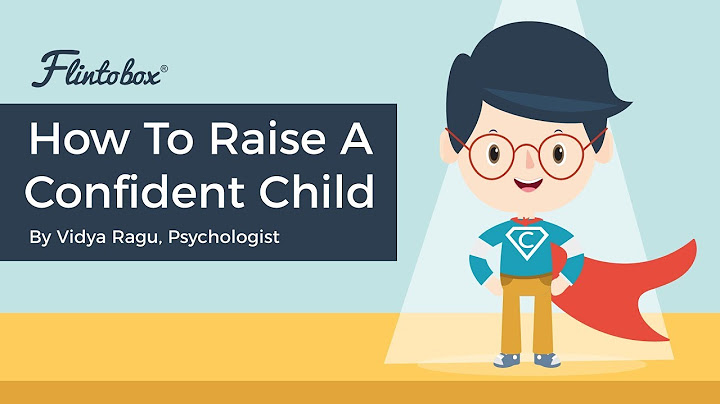
Yes, after saying this, the child might try to do something not very good to test the strength of the ice. Your task is to take it calmly and explain what he is wrong about.
You did wrong, it should be corrected. I'm upset by your behavior. But I always love you, even when I am unhappy with your behavior and scold you.
Do not demand from a child what he is unable to fulfill.
I already mentioned this above in the tips.
Each person is unique, each of us has different capabilities and abilities, and it is a bad idea to demand from a child the realization of his own unfulfilled goals and desires.
Always try to prove some statements/beliefs by your own example.
If a child sees that you are dependent on the opinion of society, try to isolate yourself from the outside world and hide in your comfort zone, do not be surprised that he will behave the same way.
If you don't want your child to repeat some of your mistakes or not the best traits of your character, learn and change with him.
Give your child the opportunity to make choices and subsequent mistakes, but do not demand from him excessive adulthood.
Children are children after all. Do not intimidate, but do not try to protect yourself from all the bad things that theoretically take place, there is no and cannot be one hundred percent insurance.
Consider the psychological characteristics of your child in all situations.
This is both temperament and his psycho-emotional state at one time or another, and much more. Your behavior also depends on the complex of the psychological capabilities of the baby.
Sometimes a child should be encouraged and motivated to, for example, do something else, and sometimes give him the opportunity to relax and calm down by stopping classes.
Teach your child to understand his feelings and accept support, make mistakes and correct mistakes
It is very useful to attend confidence courses for children aged 6-8. Because this trait is brought up from childhood. And if this age of the child has already passed, you can learn more about yourself at teenage confidence trainings. Or it is important to study the information in books so that the child understands what is happening to him and therefore develops awareness.
Because this trait is brought up from childhood. And if this age of the child has already passed, you can learn more about yourself at teenage confidence trainings. Or it is important to study the information in books so that the child understands what is happening to him and therefore develops awareness.
How I coped with my insecurities
It so happened that in my childhood and early adolescence I was a very insecure and insecure child.
This was influenced by many factors - excessive demands and expectations of parents in many ways. As a result, I developed perfectionism. It brings to something good in extremely rare cases. And also - my closeness as a character trait.
I was scared to try something new, to make mistakes, if something did not work out, I gave up, got upset and refused to try again.
I am grateful to my friends who were by my side at the age of 13.
It was only then that I began to become more relaxed, open up and, probably, became truly alive, it was all thanks to them.
Around the age of 14-15, I myself reached the point of what self-confidence is for me personally, how can I personally develop this quality in myself. Life has become much easier.
I started getting interested in psychology, it was very interesting for me to understand myself, and this field of activity helped me become who I am now. I like myself like this.
Yes, now sometimes, in some situations, I can close myself, but I'm glad that I'm learning to get out of my comfort zone and overcome some complexes, unfortunately, that appeared in childhood.
I am proud that I had the willpower not to quit halfway through what I started. It was difficult, because the people around me got used to me being quiet, withdrawn, that you can laugh at me, etc. I think that I am well done, that I have not finished fighting my fears, I have overcome myself, and most importantly, I have stopped paying attention to the opinions of society.
It is important to understand that people will always say something.






